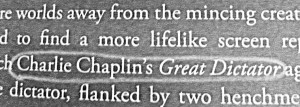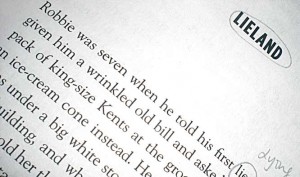January will mark the 80th anniversary of the National Socialists’ seizure of power, and popular interest in the history of the era that followed is as vivid as ever:  34-year-old Laurent Binet’s HHhH, winner of the prestigious Goncourt prize, reconstructs Operation Anthropoid, the skewed but ultimately successful mission of Czech resistance fighters to assassinate Reinhard Heydrich, National Socialist Obergruppenführer, Protector of Bohemia and Moravia, and head of the German secret services. (HHhH is an acronym for “Himmlers Hirn heißt Heydrich,” – Himmler’s brain is Heydrich – which is how Heydrich’s function was described in Nazi circles.) → continue reading
34-year-old Laurent Binet’s HHhH, winner of the prestigious Goncourt prize, reconstructs Operation Anthropoid, the skewed but ultimately successful mission of Czech resistance fighters to assassinate Reinhard Heydrich, National Socialist Obergruppenführer, Protector of Bohemia and Moravia, and head of the German secret services. (HHhH is an acronym for “Himmlers Hirn heißt Heydrich,” – Himmler’s brain is Heydrich – which is how Heydrich’s function was described in Nazi circles.) → continue reading
James Bond on Nazi Germany
Missing Elements of Literature
Searching for a Jewish past is the topic of Jonathan Safran Foer’s Tree of Codes. His best-selling, Hollywood-adapted debut novel Everything is Illuminated (2002) already depicted a young man on a trip to the Ukraine in search of his family’s past.  His new book is also a search for Jewish roots, though this time artistic, rather than biographical.
His new book is also a search for Jewish roots, though this time artistic, rather than biographical.
Experimenting with the concept of absence, the book reproduces parts of Bruno Schulz’s Street of Crocodiles, the English translation of one of two surviving texts of a writer, whose other works were lost when the National Socialists seized his Polish hometown Drohobycz in 1941 and murdered its citizens, including Schulz, in 1942. As if to depict the loss of literature by destroying the letters in a book, Foer cut into Schulz’s pages, leaving only select words and half sentences behind, thereby reducing, already in its title, Street of Crocodiles to Tree of Codes. → continue reading
Suddenly, a Knock on the Door
Three terrorists threaten a writer in his living room. They demand of him a story. Frightened, the writer looks around and begins: “Three people are sitting in a room.” The terrorists are not amused. They want fiction, not fact. But producing fiction on demand proves difficult: “It’s hard to think up a story with a barrel of a loaded pistol pointed at your head,” the writer explains.
This short story, which is the first and title story of Etgar Keret’s new collection, sets the agenda for the following 34, all of which expose fiction as we produce it daily: in dreaming and day-dreaming, fantasizing and being delusional, lying, worrying, cursing and being depressed. → continue reading